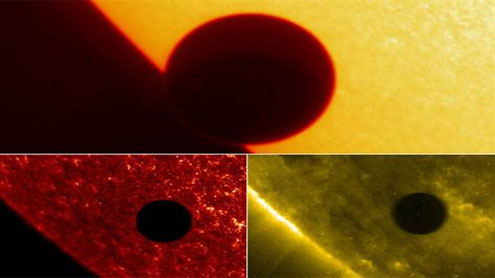
On June 5 and 6, millions of people worldwide will be able to spot Venus crossing the Sun’s face in what will be a once-in-a-lifetime experience.
Venus will take about six hours to complete its transit, appearing as a small black dot on the sun’s surface, in an event that will not happen again until 2117.Jay M. Pasachoff, astronomer at Williams College, Massachusetts, US, explores the science behind Venus’ transit and gives an account of its fascinating history, the journal Physics World reports.Transits of Venus occur only on very rare occasions when Venus and the Earth are in a line with the Sun. At other times, Venus passes below or above the Sun because the two orbits are at a slight angle to each other, according to a Williams statement.
Transits occur in pairs separated by eight years, with the gap between pairs of transits alternating between 105.5 and 121.5 years – the last transit was in 2004.Building on the original theories of Copernicus from 1543, scientists were able to predict and record the transits of both Mercury and Venus in the centuries that followed.
Kepler successfully predicted that both planets would transit the Sun in 1631, part of which was verified with Mercury’s transit of that year. But the first transit of Venus to actually be viewed was in 1639 – an event that had been predicted by the English astronomer Jeremiah Horrocks.
Pasachoff expects the transit to confirm his team’s theory about the phenomenon called “the black-drop effect” – a strange, dark band linking Venus’s silhouette with the sky outside the Sun that appears for about a minute starting just as Venus first enters the solar disk.
Pasachoff and his colleagues will concentrate on observing Venus’s atmosphere as it appears when Venus is only half onto the solar disk. He also believes that observations of the transit will help astronomers who are looking for extrasolar planets orbiting stars other than the Sun.“We are fortunate in that we are truly living in a golden period of planetary transits and it is one of which I hope astronomers can take full advantage,” says Pasachoff. – Khaleeejnews












